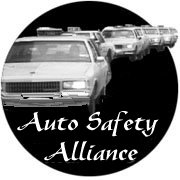A publication by the Auto Safety Alliance

| Driver
Alert
A publication by the Auto Safety Alliance |
 |
| Volume 1 | November 1997 | Issue 1 |
|
Imagine
you are driving along and your passenger leans over and whispers in your
ear, “Grandma thinks you're a bad driver.” A normal reaction might include
denial and anger. But for Dr. Leon James those words mapped out his life's
work. “My struggle to become the kind of driver my
wife and her Grandma can accept made me look at my driving problem.”
Adapting a technique from social psychology, he started carrying a tape recorder in the car. He recorded himself, saying whatever came to mind. He was astounded when he listened to the tapes. “There was so much hostility, impatience, and irrationality. I didn't know myself as a driver.” He then had hundreds of his university students carry tape recorders while driving. In listening to their tapes, he discovered that every driver has moments of rage behind the wheel. Road rage had become mainstream behavior, not just one exhibited by extreme people. “We all have road rage," Dr. James stated. “Road rage is a habit acquired in childhood. Children are reared in a car culture that condones irate behavior as part of the normal wear and tear of driving,”Dr. James explained. He cautioned that “it will take an entire generation to overcome the road rage habit.” Undaunted, he is working to find solutions to road rage. “However, that will take more than conventional drivers’ education to overcome,” he stated. Currently, Dr. James’s students are investigating how
American society transmits the culture of aggressiveness behind the wheel.
Dr. James posts their findings on his
He also devised a new rating system for TV and movies which he called Drivers Behaving Badly (DBB). Using his DBB system, he has been rating the media for its portrayals of dangerous and antisocial driving behaviors. Such portrayals also imply that dangerous driving is cool and glamorous. “Surely this has affected both children and adults,” he surmised. Dr. James predicted that safe driving would lower the cost of automobiles and save lives. Crashes and injuries cost the economy 150 billion dollars and 42,000 lives annually. Fifteen years later, Dr. James still finds himself struggling with his own driving behavior. His wife is happier with his driving, but not by much. “She often has to tell me, ‘Hey, come on, Leon, wave to that driver who just let you in.’ ” However, Dr. James remains committed to a lifelong U-turn
in his driving behavior. “I'm convinced that this has improved our marriage
and I recommend it to all couples, including unmarried ones. Let your passenger
be your coach.”
|